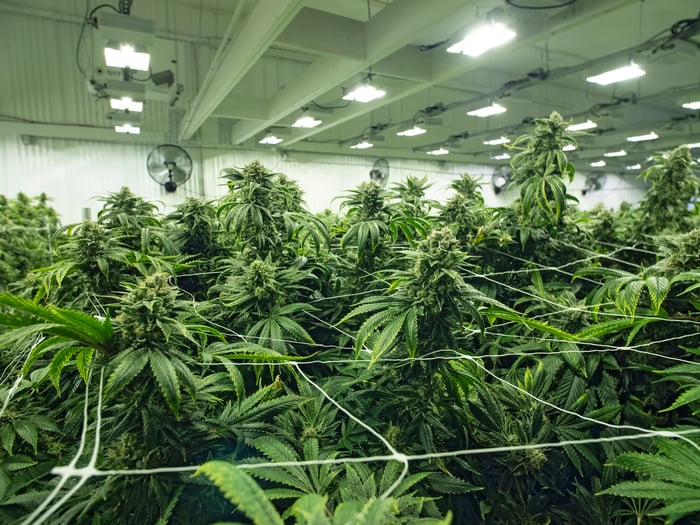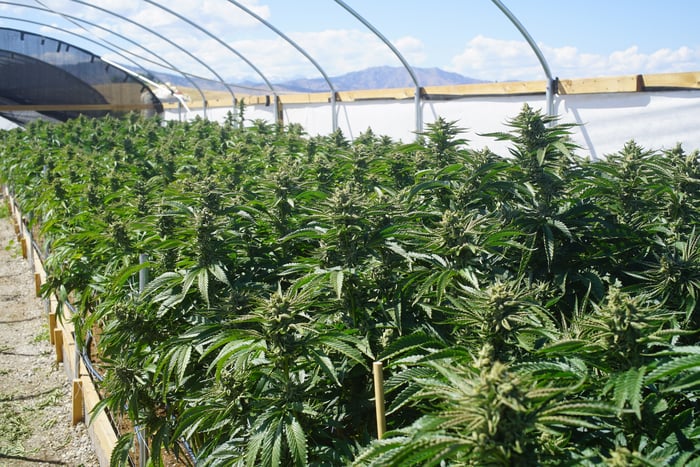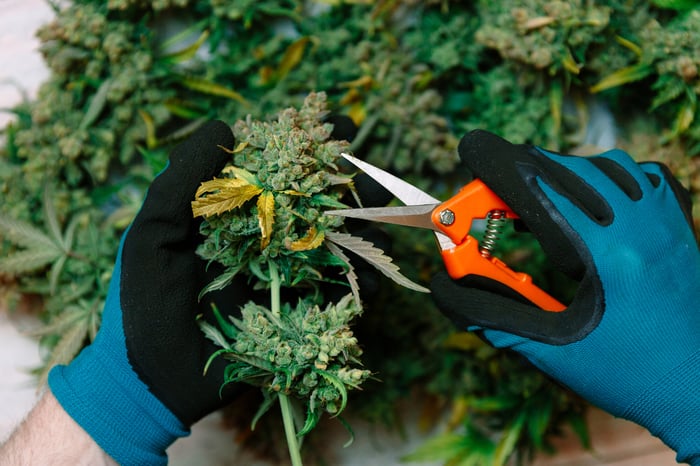When it comes to investing in the marijuana industry, production isn't everything. But let's be clear -- it's still a really important piece of the puzzle. But what's arguably more important than simple peak production is how well cannabis growers convert their licensed square footage into yield. In other words, efficiency is king.
Throughout the Canadian pot-producing industry, the average crop yield tends to be about 100 grams per square foot. However, two pot stocks have blown this average yield out of the water. Flowr Corp., which specializes in ultra-premium dried flower and oils, is using genetics to boost its yields to between 300 grams and 450 grams per square foot.
There's also Atlantic-based OrganiGram Holdings, which should be able to produce 113,000 kilos of peak annual output with only 490,000 square feet of growing space. Using three tiers of growing at its lone Moncton, New Brunswick, campus is its secret to about 231 grams of yield per square foot.

Image source: Getty Images.
Production efficiency isn't high on the list for these marijuana stocks
Yet while some marijuana growers are dazzling Wall Street with their production efficiency, others are stinking up the joint (pardon the blatant pun). The following four pot stocks are all yielding less than 100 grams per square foot, which could lead to higher-than-expected production costs and/or lower-than-industry-average margins.
Emerald Health Therapeutics & Village Farms International
Let's begin with Emerald Health Therapeutics (EMHT.F) and Village Farms International (VFF 8.13%), which I've combined because of their British Columbian joint venture known as Pure Sunfarms.
Both companies entered into their joint venture in 2017, with the initial purpose of retrofitting a 1.1-million-square-foot vegetable-growing facility owned by Village Farms to grow cannabis. With this Delta 3 facility now complete, it's expected to yield 75,000 kilos of weed across 1.03 million square feet of growing space. The remaining space is set aside as a nursery and for processing.
Then, on April 1, Emerald Health exercised an option via the joint venture to acquire a second 1.1-million-square-foot vegetable-growing facility adjacent to Delta 3 that'll be retrofit to cannabis production. Like the Delta 3 facility, Delta 2 (as this new cultivation farm will be known) will be capable of 75,000 kilos a year, though it'll feature slightly more square footage devoted to growing since a nursery isn't needed, given its close proximity to the Delta 3 facility. All told, that's 150,000 kilos for Pure Sunfarms over roughly 2.1 million square feet of growing space. This works out to somewhere between 71 grams and 72 grams per square foot, which is nearly 30% lower than the industry average.

Image source: Getty Images.
If there's some solace here for Village Farms' investors, it's that their company has a fallback vegetable-growing business. Although growing vegetables tends to be low-margin and weather-dependent, it nevertheless can generate around $150 million in sales a year.
Emerald Health, on the other hand, is bringing its production to market later than most of its peers and doesn't have a secondary business like Village Farms to lean back on.
HEXO
It might surprise investors to learn that one of the top-performing marijuana stocks in 2019, Quebec-based HEXO (HEXO), is also toward the lower end of the totem pole in terms of production efficiency.
HEXO has made headlines for its dealmaking ability. It struck a five-year agreement with its home province of Quebec to supply an aggregate of 200,000 kilos of cannabis in April 2018, and had investors bubbling with excitement after forming a 57.5%-42.5% joint venture with Molson Coors Brewing in early August (Molson Coors has the majority stake). But HEXO itself isn't a very efficient grower. Its Gatineau campus in Quebec spans 1.31 million square feet, but is only expected to produce 108,000 kilos at its peak.
Furthermore, in March, HEXO announced that it was acquiring Newstrike Brands for about $197 million in an all-stock deal. Newstrike's lone campus will span 470,000 square feet, when complete. While the deal to acquire Newstrike also came with branding opportunities and added provincial deals, it's only expected to boost output by roughly 42,000 kilos, at its peak.

Image source: Getty Images.
So, to summarize, HEXO has 1.79 million square feet of cultivation space, but only expects 150,000 kilos of aggregate output. That's an underwhelming yield of between 83 grams and 84 grams per square foot.
Now, the good news is that HEXO has done a good job of making up for its subpar yields through its dealmaking and its focus on cannabis derivatives. HEXO has a 579,000-square-foot processing and research facility in Belleville, Ontario, that'll play a key role in boosting its extraction capabilities. It also recently signed a two-year extraction deal with Valens GroWorks that enhances its extraction potential and broadens its high-margin portfolio of cannabis derivatives.
Cronos Group
Last, but not least, the third-largest pot stock in the world, Cronos Group (CRON -1.66%), isn't delivering nearly the production efficiency you'd expect of a company its size. Generally, larger growers are able to benefit from economies of scale, but this isn't the case with Cronos, which doesn't have many large cultivation facilities.
Cronos Group's two largest grow farms are its joint venture (Cronos GrowCo) with a group of investors, and its wholly owned Peace Naturals in Ontario. Cronos GrowCo is an 850,000-square-foot grow farm that's expected to be complete by the midpoint of 2019 and yield 70,000 kilos at its peak. As for Peace Naturals, it covers about 325,000 square feet, some of which is devoted to processing and other non-cultivation operations, and should yield close to 40,000 kilos. Cronos Group's remaining peak growth comes from Australia (2,000 kilos) and Israel (5,000 kilos), which have 20,000 square feet and 45,000 square feet of cultivation capacity, respectively.

Image source: Getty Images.
Inclusive of its small OGBC grow farm, this works out to around 117,500 kilos of peak annual output spanning 1.27 million square feet. Taking into consideration that a small portion of this square footage is devoted to processing, Cronos Group is producing closer to 95 grams per square foot, or about 5% lower than the industry average.
As with HEXO, Cronos Group gets a bit of a reprieve for its poor production due to its dealmaking and derivatives. Cronos closed on a $1.8 billion equity investment from tobacco behemoth Altria in March, which provided the company with a much-needed cash buffer. Also, it partnered with Ginkgo Bioworks in September in a deal that could cost it up to $100 million. But in exchange for its investment, Cronos Group gains access to Ginkgo's microorganism platform, allowing it to create yeast strains capable of producing specific (and sometimes rare) cannabinoids.
Still, even with Cronos Group's cash pile and focus on derivatives, it's a very expensive stock that's marred further by a subpar crop yield.





